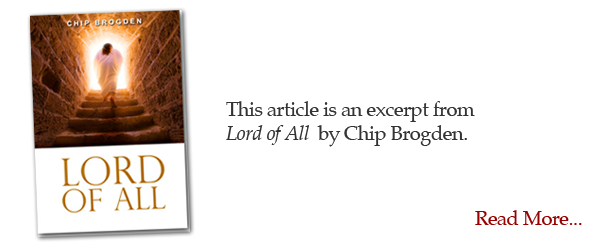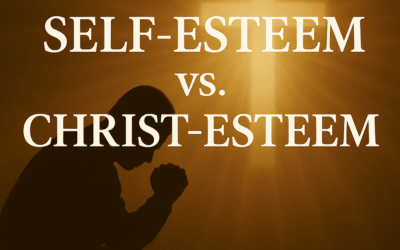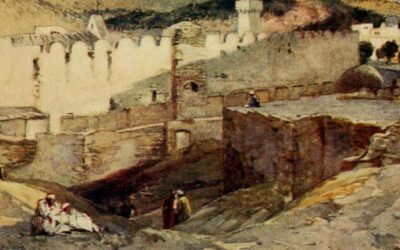In other words, everything God has done, is doing, and will do is related towards revealing His Son and bringing us into the full-knowledge (epignosis) of Him. The goal is for Christ to have the preeminence in all things, beginning with us individually as disciples, then with the Church, and finally with all creation, “that He may be All in All.”
He MUST increase. Isaiah tells us that there will be no end of the increase of His government and peace. In the beginning was the Word, and we can see how God has worked steadily from the beginning to increase Christ. From types and shadows in the Old Testament we see Christ coming into view. Then the Word is made flesh and dwells among us, and Christ is increased yet again. Next He comes to dwell within us, and this is a major increase. Finally, He begins to conform us to His own image through the indwelling Life. If we are growing up into Him then He is increasing daily. Eventually every knee will bow and every tongue will confess that Jesus Christ is Lord. Beyond this, we are told that God will continue to reveal His Son in the ages to come, bringing us into depths and dimensions of Christ that we cannot fathom.
God is not moving backward, but in the Son and through the Son, He moves steadily forward. Christ MUST increase. This is the Law of the Spirit of Life in Christ Jesus. Just as we cannot have gravity without having the law of gravity, so it is impossible to have the Life of the Lord but not have the Law of that Life. And the Law of Life is that Christ must increase.
What Prevents the Increase of Christ?
“But I must decrease.” Why doesn’t God reveal His Son to us, in all His glory, all at once? What prevents Christ from filling all things and having the preeminence now? Why do we not yet see all things submitted to Him? Because we must be decreased. If He is to become greater then I must become lesser. When Paul says, “Not I, but Christ,” he is saying “He must increase, but I must decrease.”
Just as all things are working together towards God’s purpose of increasing Christ, so all things are working together towards decreasing us. It does not matter if we understand it or comprehend it. It does not matter if you believe in it or agree with it. You are being decreased just the same, and Christ is being increased. It MUST be so, therefore it IS so. Scientists call this decreasing “entropy”, and it means, “inevitable and steady deterioration”. We can observe this in creation. The present things are groaning and travailing in pain, deteriorating in order to make way for a new heaven and a new earth. We begin to die as soon as we are born. We can look in our own bodies for evidence of “inevitable and steady deterioration” as we move towards a redeemed body. But more importantly, WE, the “I”, the “Self”, is being decreased that Christ may fill us.
How are we decreased? Let us say right away that it is not your duty to decrease yourself, to become an ascetic, and crawl around in the dirt in abject poverty. It is not an outward decreasing, but an inward decreasing, a coming to the end of ourselves. The Kingdom of God belongs to the poor in spirit. Earlier, John said, “A man can have nothing except he receive it from heaven.” Now we may have quite a bit, but if we obtained it from a source other than Christ, it amounts to nothing. Only those sufficiently decreased, the poor in spirit, can see this. This poverty cannot be achieved through self-effort. In fact, part of the decreasing process is the realization that I can do nothing of myself, including decreasing myself. Just as I cannot commit suicide by crucifixion, so I cannot crucify my flesh. The only way to learn this is to fail hundreds, even thousands of times. Then we will learn to say, “I have no confidence in the flesh.”
In the world we will experience temptations, testings, and trials. We will experience persecution, tribulation, and afflictions of soul and body. We will experience mistreatment and misunderstanding. It is not a question of God allowing or not allowing things to happen. It is part of living. Some things we do to ourselves, other things we do to each other. Our Father knows about every bird which falls to the ground, but He does not always prevent it from falling.
What are we to learn from this? That our response to what happens is more important than what happens. Here is a mystery: one man’s experience drives him to curse God, while another man’s identical experience drives him to bless God. Your response to what happens is more important than what happens.
If we see that offenses are bound to come, that there is no way to live in the world apart from what happens, then we must see that the difference between overcoming and not overcoming lies in our response to what happens.
Entering the Gate vs. Walking the Path
Paul did not pray to be weak so that he could be strong. Naturally speaking, we despise weakness. We prefer strength. But human strength is an illusion. It is not true strength. The Lord shows us His grace is made perfect (or, is matured) through our weakness. Now, Paul rejoices in his weakness, in his being decreased: for “when I am weak, then I am strong.” To the degree that we accept the decrease of ourselves, to that degree will we experience the increasing of Christ.
We cannot walk the narrow path until we have entered the narrow gate. But we cannot assume that because we have entered the narrow gate we are now finished. Most people lay stress on the gate, and their goal is to get people just far enough through the gate that they can claim salvation. That is where most of the Church sits today, just inside the narrow gate, rejoicing in a future salvation, a future heaven, a future return of Christ, and a future reward. But the narrow gate is only the beginning. The narrow gate only opens the door to the narrow way. It is the narrow way which leads to Life, and few find it. Fewer still walk to the end of it.
Now what we are discussing is an event as well as a process. There is a once-and-for-all decision to follow Christ, but we have to keep on following. Entering the gate is a once-and-for-all event, but walking the path is a process. We gain everything when we enter the gate, but we must walk the path in order to now live out of what we have. We are new creations, but we are being changed daily into the image of Christ. We died with Christ once: yet we die daily. We were crucified with Him once: yet we take up the cross daily. We were raised with Him once: yet we experience His Life daily. We were ascended with Him and we were seated with Him in the heavenlies once: but we live out the heavenly position in our daily walk, daily ascending above the earth, above the natural, to sit with Him in His throne as overcomers.
God wills that “all men would be saved (narrow gate) and would come to the full-knowledge [epignosis] of Truth (narrow way).” Those who merely enter the narrow gate have yet to satisfy God’s heart. There is rejoicing in heaven over one sinner who repents, but as Arthur Katz has said, “Many are saved, but few are converted.” It is God’s will, His desire, that we come to the end of ourselves so that Christ may have the preeminence in us. Jesus said, “If you have seen Me, you have seen the Father.” Hebrews tells us that Christ is the brightness of God’s glory, and the express image (or exact representation) of His person. Likewise, God’s purpose for us as disciples (and by extension, the Church) is “if you have seen a disciple, you have seen Jesus.” The Christian is to be the brightness of Christ’s glory, and the exact representation of His person. I lack the vocabulary to express this adequately, but I trust the Lord will show us.
This is beyond “mere salvation”, this is conversion, this is conformity to the very image of Christ. He most certainly does not have the preeminence in us now, thus, “He must increase, but I must decrease.”
We have emphasized the Church for so long that we have lost sight of the individual disciples of which the Church consists. If one member lacks, the entire Body goes lacking. It is not so much a problem with the Church failing to apprehend its fullness as it is the individual disciples of the Lord failing to count the cost, suffer all as loss, and progress down the narrow way towards Christ as All in All. As the disciples go, so goes the Church. If Christ does not have the preeminence in the Church, it is because He does not have the preeminence in us as disciples.
Live and Learn
If we have truly entered the gate and are walking the path, if we have truly yielded our lives to Him and long to know Him, then everything we experience is working to increase Christ and decrease us. On the positive side, the Holy Spirit is working to bring us into a more perfect knowledge of Christ. The Spirit is increasing Him, leading us into “all Truth”, towards epignosis. On the negative side, the principle of the Cross is working to decrease us, to bring us to the end of ourselves, to reduce us to nothing. Eastern mysticism has long been aware of this positive and negative at work, it has simply misunderstood what it means and misappropriated it towards an end other than Christ. They have observed a principle but lack the Truth to explain the principle.
We must see that for every decrease of Self, Christ is increased. Even in our discussions we groan inwardly about having to die daily, having to give up our way and our will. We ought instead to be excited about Christ being increased, and how much He stands to gain in us and through us. He MUST increase, but you MUST decrease. It is better to relinquish everything now, on a voluntary basis, and lose our lives in order to gain our real Life. It is more glorious to enter the Kingdom out of a desire to give Christ the preeminence than to enter kicking and screaming and crying because we love ourselves too much. Make no mistake, if it is the Kingdom you seek, the Kingdom you will find, but you must be changed in order to enter therein. If you seek power from God you will have to accept weakness in yourself. If you want to rule with Him you must suffer with Him. If you want His Life you must give up your life. You can have either one you want, but you cannot have both. There is no increase without decrease, and there is no decrease without increase.
May the Son be increased through these words. Amen.













